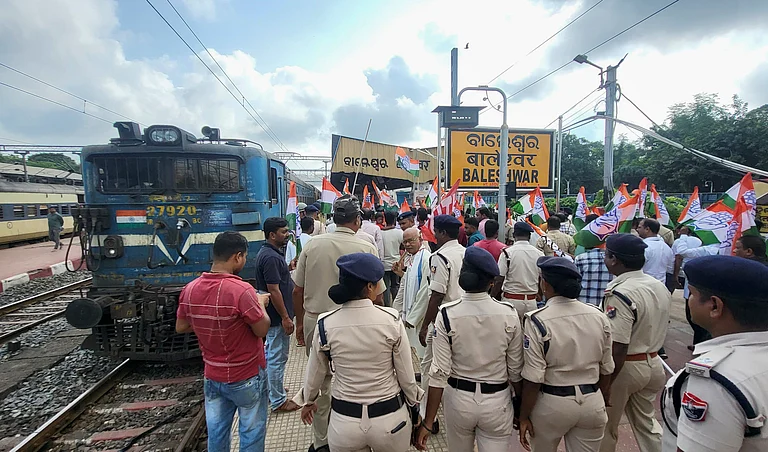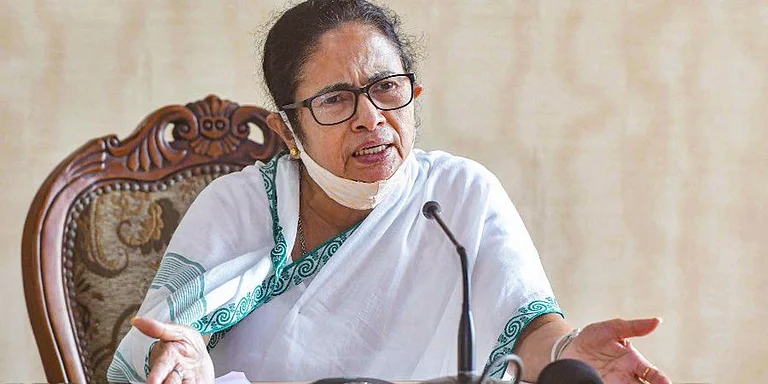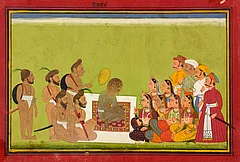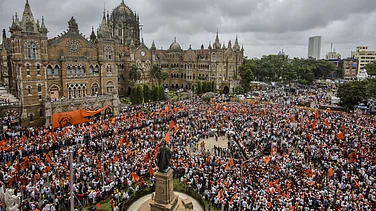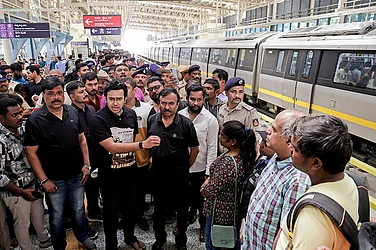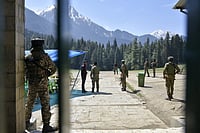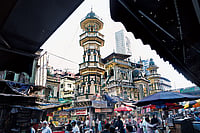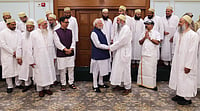It’s close to midnight on Saturday. A heavy gold door opens and leads into a private den on the fourth floor of the Singh House. The palatial, six-storey bungalow in the distant suburb of Borivali’s Chikuwadi boasts of a surreal entrence decored with life-size statues of Greek soldiers and miniature idols of the goddess Durga, next to each other.
A lady in a fiery red-and-gold designer gown, with a scarf adorned with loose gold tassels draped over her shoulders, emerges from her meditative trance. Wearing red lipstick, a red teeka with a diamond bindi on the forehead, her face is powdered with pink blush; and her hair is partly gathered in a puff bun. Holding a dainty gold trishul in her right hand, the 59-year-old is seated as if in meditation at the edge of a gold and red sprawling bed.
Radhe Maa is ready for darshan.
A frenzy of excitement sweeps over the waiting visitors on the ground floor of the mansion. “Aap sab pe Dhe Maa (short for Radhe Maa) ki kripa hone wali hai (All of you will be blessed by Dhe Maa),” says Gaurav Kumar, her chief aide, who goes by the name of Talli Baba. “She is a goddess for us. When you witness her aura and glow, it makes you realise that she is not just a common human being, she is a divine power herself.”
Radhe Maa’s private quarters for resting and meditation, called the gufa or den, resemble an elaborate set from a Hindu mythological TV series. Entry is strictly restricted for outsiders. The room features large, ornamented gold panels on the walls, bed and chairs. The flooring, furniture upholstery, curtains and bedsheets are all red, matching her attire. The eye-popping red is everywhere. Visitors, on entering her sanctum, must wear a red headband inscribed with Jai Shri Radhe Maa in gold.
The self-styled spiritual leader is extolled by her followers as a mother and an avatar of Durga, despite a string of allegations of dowry harassment, embezzlement and sexual misconduct. In the past, videos of Radhe Maa, being carried on the shoulders of male devotees, dancing to Bollywood songs and prancing around in a hot pink mini skirt, boots and a beret have caused outrage against her for obscenity and defaming the Hindu religion. The Akhil Bharatiya Akhara Parishad, an apex body of Hindu sadhus, has added her name to a list of 14 fake godmen (and women) for promoting blind faith.
Born in 1965 as Sukhwinder Kaur in a poor family in Punjab’s Gurdaspur, Radhe Maa’s journey to becoming one of the most recognisable figures in Mumbai is nothing short of the stuff that potboiler fiction is made of. Large hoardings of her face beam prominently at several locations on the city’s vast expanse of railway lines and flyovers, making her a household name. She was a guest on Big Boss’s Season 14 in 2020.
Kaur married Mohan Singh of Mukerian in the Hoshiarpur district of Punjab and became a mother of two sons at age 20. Singh migrated to find work in a Gulf country to make ends meet, leaving her alone in a joint family. She earned a living as a tailor and taught tailoring to destitute women, young widows and girls. “I was religiously inclined but used to be very sad. I wanted to know about myself and my purpose,” says Radhe Maa. Her father took her to meet Mahant Ramadheen Das, a godman said to be over 100 years, who turned her onto the path to spirituality. The godman saw ‘fire’ in Kaur and advised her to channelise the energy, she says.
“For nine days, I closed myself in a small room and worshipped the goddess Durga. When I came out, whatever I told people came true. People started experiencing miracles and more people started coming to my satsangs,” Radhe Maa adds. A follower of Guru Nanak and Durga, Radhe Maa is associated with Dera Paramhans, based at Mukerian, her marital village.
Radhe Maa resides in Singh House with her entire family, including Mohan Singh and sons Bhupinder Singh alias Bunty and Harjinder Singh alias Nishu and their wives and children. But does not maintain marital relations. Mohan Singh owns a bike showroom in Dahisar called RM Motors short for Radhe Maa, while her sons run a company called BNH traders. Harjinder is also an actor and made his OTT debut in a series called Inspector Avinash alongside Randeep Hooda.
Inside the den, visitors line up to seek her blessings. Some have brought along colourful chunnis, others offer money, flowers and tie a yellow thread to her hand. In return, Radhe Maa hands over a one-rupee coin, a red and yellow chunni—as blessings to a select few. Soon, she stands on the bed, trying to straighten on the wobbly mattress, sporting a beatific smile, as devotees break in loud chants of Jai kara Sherawali and Jai Radhe Maa.
The crowd turns ecstatic when Radhe Maa’s bhajans, remixed to popular Bollywood tracks are played in the background. A young woman dressed in a black and pink coordinated set, gets up and begins to dance joyfully to the tune of rang chadh gaya maa da laal (blessed by Mother’s red colour).
Rickshaw driver Gulabdhar Gupta, a first-time visitor to the Singh House, is overwhelmed by emotion. Drowned in heavy debt and living a hand-to-mouth existence, the rickshaw driver hopes for a miracle. “I am worried and stressed. Nothing seems to be working. Every opportunity I invested in failed to take off,” he says, almost close to tears. “If Radhe Maa’s blessings help me, I will become her devotee for the rest of my life.”
Hundreds of hopefuls like Gulabdhar visit the Radhe Maa Bhawan every fortnight to meet the alleged godwoman. Her influence and popularity are undiminished, despite the clouds of controversy looming over her.
“God has instilled divine powers in me. Anyone who worships me with true conviction or calls on me for miracles, receives my blessings. That is how my followers grow,” she says.
Stories of miracles and divine intervention are repeatedly shared by Radhe Maa’s devoted followers. Vipin Ahuja, a legal officer at Global Advertisers and her follower for 20 years, credits her with the birth of his two daughters after doctors had said his wife could not conceive.
Jasdeep Singh, a manager at MM Mithai, says he has risen out of bleak poverty due to Radhe Maa. Both men are associated with the Gupta family, Radhe Maa’s well-known disciples, and volunteer at the Singh house with their family and children.
Radhe Maa asserts her identity as a female spiritual leader in a male-dominated world. Unlike traditional godwomen in saffron robes, she embraces red and gold, that closely resembles her appearance as a North Indian bride. These aesthetic challenges patriarchy and celebrates naari shakti.
In an interview with Outlook, she and her aides defended her lavish lifestyle and appearances in designer wear, claiming they were all gifts from the devotees. “Radhe Maa doesn’t make any demands for offerings. Her followers are like saplings. When they grow and prosper with her blessings, they become like a tree. They are wealthy and earn in crores. If they wish to part with some of these fruits from their tree at Radhe Maa’s feet, there is nothing wrong,” says Talli Baba.
“Why should I not do shringaar? I am not a sadhvi, I am a mother, why should I not adorn myself? I have so many children who pamper me with gifts. Shringaar is a gift of women.”
Reports suggest Radhe Maa is fond of offerings like make-up, especially red lipstick, accessories, designer handbags, and gowns from her devotees. “Who says you cannot do bhakti and reach close to God by wearing good clothes,” Radhe Maa retorts in her Punjabi-accented Hindi. “Why should I not do shringaar? I am not a sadhvi, I am a mother, why should I not adorn myself? I have so many children who pamper me with gifts. Shringaar is a gift of women.”
Since arriving in Mumbai in 2003, Radhe Maa has cultivated a tight-knit cult of wealthy industrialists, politicians, celebrities and police officials, along with the Gupta family, the owners of Global Advertisers and MM Mithaiwala.
“Sanjeev Gupta and his wife are very loving and down to earth. All family members are my bhakts and sevadars (disciples and volunteers). I love them and they love me. They are like my children,” Radhe Maa says about her most known disciple. “Around 25 years ago, we were in deep trouble. No one from our family or relatives helped us. Radhe Maa was the only figure who stood with us. Whatever we are today, it is because of her,” says Sanjeev Gupta, the owner of Global Advertisers and Managing Trustee, Mamtamai Shri Radhe Guru Maa Charitable Trust.
Sanjeev met Radhe Maa at her Delhi satsang and persuaded her to move to Mumbai, where she lived with the Gupta family and held religious congregations. The Guptas made her popular through citywide hoardings, but in 2014, Nikki Gupta, a daughter-in-law, filed a domestic violence and dowry harassment case, naming Radhe Maa. She alleged, that her in-laws forced her to work at their Borivali house, facing physical and mental torture. Sanjeev claimed the case was due to internal family disputes and was not linked to Radhe Maa. Though police initially dropped charges against the godwoman, Nikki’s family sought Bombay High Court intervention, leading to Radhe Maa’s inclusion. Last year, a Sessions court discharged the case, observing that no domestic relation existed between Radhe Maa and Nikki. The Nikki Gupta case and the press expose left a huge dent in Radhe Maa’s popularity and forced her to withdraw herself briefly from the public eye. “Any bad experience is a learning point. I don’t wish bad for her, but truth prevails in the end. Satyamev Jayate,” Radhe Maa insists.
But the controversies kept escalating.
After the dowry case, Gupta family patriarch, Manmohan Gupta (before he passed away in 2022), filed a non-cognisable complaint against Radhe Maa, alleging she used black magic on his sons and tried to usurp his bungalow. TV and film artist Dolly Bindra, a former devotee, filed a case of vulgarity, accusing Radhe Maa of sexual voyeurism, nudity and misconduct. Bindra claimed she was groped and kissed by female devotees at Radhe Maa’s incitement.
“If such incidents can happen with a strong woman like me, imagine the plight of poor women and even men,” Bindra said, also accusing Radhe Maa’s son Bunty and aide Talli Baba of stripping and exposing their genitals during a religious congregation.
Vasan Ahir, a Gujarat BJP MLA, had accused Radhe Maa of causing a mass suicide in Gujarat’s Kutch district, where one Raghu Jaru and his family committed suicide after donating Rs one crore to the godwoman, according to media reports.
Radhe Maa denied the allegations, claiming they were false. Although she preaches her followers to devotion to parents and love to humanity, she remarks, the controversies made her realise “yeh duniya pyaar ke layak nahi hai. (The world is not deserving of love).”
Lawyer Falguni Brahmabhatt, who filed a public interest litigation (PIL) at the Bombay High Court in 2015, alleging vulgarity, misuse of charity and religious sentiment after attending a satsang at Radhe Maa’s house, alleges that the godly avatar in a way amounts to impersonification to allegedly cheat people. “Her house is a den of crooks where she and her close circle of followers take advantage of poor, vulnerable people under the garb of religion. She blindly dupes people, portraying herself as a godwoman, misusing the religion,” Brahmabhatt further alleged.
The PIL was dismissed, as were the other police complaints against the godwoman in which no FIR was filed.
According to Brahmabatt, the clique around Radhe Maa has protected her from meeting the same fate as godmen like Dera Sacha Sauda Chief Gurmeet Ram Rahim Singh or Asaram Bapu. “She is very powerful and has a lot of money, but no one knows where this money is coming from. No one is investigating her. If law enforcement agencies decide to pursue action against her, a lot of skeletons will come tumbling down from her closet,” the lawyer alleged.
MORE FROM THIS ISSUE
Radhe Maa says she is unafraid and unbothered about the fate of other godmen, gurus and babas. Like them, she was not running to accumulate wealth and property and build temples in her name. “It is my principle that I will not build ashrams or temples. I am very content with my followers. My children have built me this big house and I’m happy with what I have.”
(This appeared in the print as 'The Lady In Red')







